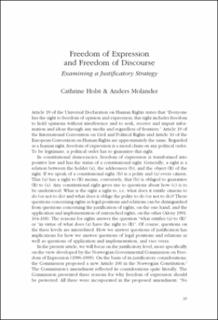| dc.description.abstract | Article 19 of the Universal Declaration on Human Rights states that “Everyone has the right to freedom of opinion and expression; this right includes freedom to hold opinions without interference and to seek, receive and impart information and ideas through any media and regardless of frontiers.” Article 19 of the International Convention on Civil and Political Rights and Article 10 of the European Convention on Human Rights are approximately the same. Regarded as a human right, freedom of expression is a moral claim on any political order. To be legitimate, a political order has to guarantee this right. In constitutional democracies, freedom of expression is transformed into positive law and has the status of a constitutional right. Generally, a right is a relation between the holder (a), the addressees (b), and the object (R) of the right. If we speak of a constitutional right, (b) is a polity and (a) every citizen. That (a) has a right to (R) means, conversely, that (b) is obliged to guarantee (R) to (a). Any constitutional right gives rise to questions about how (c) is to be understood: What is the right a right to, i.e. what does it entitle citizens to do (or not to do) and what does it oblige the polity to do (or not to do)? These questions concerning rights as legal positions and relations can be distinguished from questions concerning the justification of rights, on the one hand, and the application and implementation of entrenched rights, on the other (Alexy 1991: 164-168). The reasons for rights answer the question “what entitles (a) to (R)” or “in virtue of what does (a) have the right to (R)”. Of course, questions on the three levels are interrelated. How we answer questions of justification has implications for how we answer questions of legal positions and relations as well as questions of application and implementation, and vice versa. In the present article, we will focus on the justificatory level, more specifically on the view developed by the Norwegian Governmental Commission on Freedom of Expression (1996-1999). On the basis of its justificatory considerations, the Commission proposed a new Article 100 in the Norwegian Constitution 1. The Commission’s amendment reflected its considerations quite literally. The Commission presented three reasons for why freedom of expression should be protected. All three were incorporated in the proposed amendment: “No person may be held liable in law for having imparted or received information, ideas or messages unless such liability can be justified in relation to the grounds for freedom of expression, which are the seeking of truth, the promotion of democracy and the individual’s freedom to form opinions.”2 Today, this passage is part of Article 100 of the Norwegian Constitution. The Commission’s view strongly relies on the Norwegian philosopher Gunnar Skirbekk’s attempt to clarify the normative foundation of freedom of expression as a constitutional right.3 Skirbekk was himself a member of the Commission. Moreover, the Commission itself very explicitly states in its report – in the chapter on justification (“Why freedom of expression?”) – that it follows Skirbekk’s explication of the three reasons for freedom of expression (19, n. 7).4 The three reasons are referred to as the principle of truth, the principle of democracy and the principle of autonomy. Together, the Commission says, these principles give a robust and potentially universal justification of the freedom of expression (25). 5 We start out by presenting the Commission’s argument for freedom of expression and Skirbekk’s philosophical elaboration of it. In the following paragraphs, we clarify and discuss the argument more thoroughly, and argue that the Commission and its philosopher have chosen a questionable justificatory strategy. | en_US |
